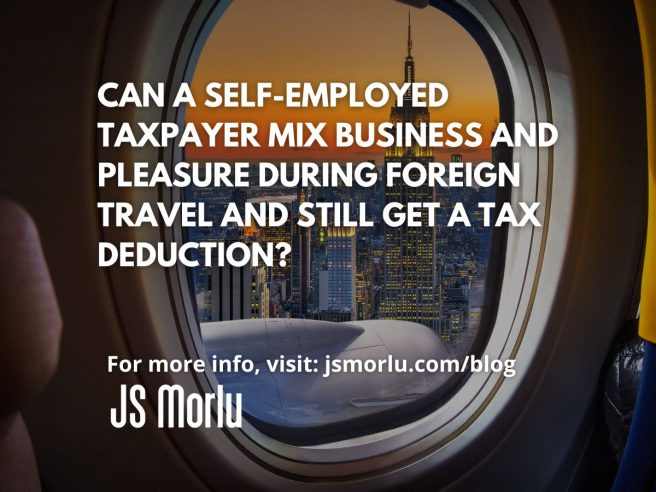Traveling the world for business can be an exciting perk of being self-employed. But what about the tax implications? Can you deduct the cost of your entire trip, or just the business portion? The answer depends on several factors, especially if your trip blends business with pleasure. Here’s a breakdown of the tax rules for self-employed individuals taking foreign business trips, including those with a vacation twist.
Fully Deductible Business Trips
If your foreign business trip is entirely dedicated to work, you’re in luck! All ordinary and necessary business expenses, just like a domestic trip, are deductible. This includes flights, accommodation, meals (with some limitations), local transportation, and incidental costs.
Partially Deductible Business Trips with Vacation Elements
Things get a bit more complex if your trip combines business and leisure. Here’s where those weekend getaways after a business meeting come into play. The deductibility of your travel expenses depends on whether your trip is considered “primarily business” or “primarily vacation.”
- Primarily Vacation: If your main purpose is leisure, with only a minimal amount of business conducted (think a quick meeting sandwiched between sightseeing), travel costs to and from the destination become non-deductible. However, other expenses like meals and lodging can still be partially deducted based on the number of business days spent on the trip.
- Primarily Business: Here’s the sweet spot! If your trip is mainly for business and meets one of the following conditions, you can deduct the full cost of travel to and from your foreign business destination:
- The trip is short: The business portion lasts one week or less (excluding departure day but including return).
- Limited leisure time: Less than 25% of your total time abroad is spent on non-business activities.
- Vacation wasn’t a major factor: You can prove a personal vacation wasn’t a significant purpose of the trip.
- Limited control over arrangements: Someone else, not you, had substantial control over planning the trip itinerary. (This is rare for self-employed individuals since they typically have control over their schedules.)

What Qualifies as Business and Non-Business Time?
Understanding the difference between business and non-business days is crucial for claiming partial deductions. Here’s a quick guide:
- Business Days:
- Travel days to and from the destination (via a reasonable route)
- Days spent conducting business
- Weekends or standby days falling between business days
- Days planned for business that were canceled due to unforeseen circumstances
- Non-Business Days:
- Days spent on leisure activities
- Weekends, holidays, and standby days following business activities, especially if you extended your stay for personal reasons
Foreign Conventions and Business Events
Thinking of attending a business conference in Europe? There’s a catch! Generally, travel expenses for conventions held outside North America aren’t deductible unless you can prove:
- The meeting directly relates to your business.
- Holding the meeting outside North America is just as reasonable as holding it within (which includes Canada, Mexico, and many Caribbean and Central American countries).
Cruise Ship Conventions? Forget About It (Mostly)
Taking a business-related cruise convention sounds appealing, but the tax benefits are limited. Deductions are only allowed if the ship is a U.S. flagship with all ports of call within the U.S. or its possessions. Additionally, there’s a maximum deduction of $2,000 per attendee, and specific documentation is required.

Traveling with a Spouse? Here’s the Deal
Generally, travel expenses for spouses or dependents accompanying you on a business trip are not deductible. However, there are exceptions:
- The spouse or dependent is a bona fide business employee.
- Their travel has a legitimate business purpose.
- The expenses would be deductible as business costs if they incurred them separately.
On a brighter note, the cost of a single hotel room (which often doesn’t differ much with double occupancy) is usually deductible. Similarly, when traveling by car or ride-sharing services, the entire transportation cost is typically deductible since your spouse is sharing the ride.
The Takeaway: Planning Makes Perfect
As you can see, navigating the tax implications of foreign business trips with a leisure twist can be complex. If you’re planning such a trip, consulting with a tax advisor is highly recommended. They can help you structure your trip to maximize deductions and ensure you comply with IRS regulations.
JS Morlu LLC is a top-tier accounting firm based in Woodbridge, Virginia, with a team of highly experienced and qualified CPAs and business advisors. We are dedicated to providing comprehensive accounting, tax, and business advisory services to clients throughout the Washington, D.C. Metro Area and the surrounding regions. With over a decade of experience, we have cultivated a deep understanding of our clients’ needs and aspirations. We recognize that our clients seek more than just value-added accounting services; they seek a trusted partner who can guide them towards achieving their business goals and personal financial well-being.
Talk to us || What our clients says about us


